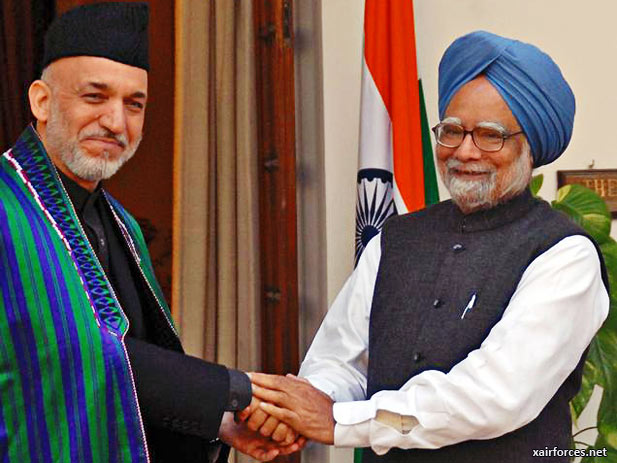
Should India Provide Direct Military Aid to Afghanistan?

Over the past decade, India has invested heavily in Afghanistan’s reconstruction. Recognizing India’s significant economic and development contributions, the United States has called on New Delhi to play an important role in the new Silk Road initiative aimed at transforming Afghanistan into a regional trade hub.
At the same time, New Delhi has been reluctant to become directly involved in supporting Afghanistan’s nascent security sector. The many uncertainties surrounding next year’s security transition from international to Afghan leadership raise further questions about New Delhi’s role in the Afghan endgame.
India’s decision-makers acknowledge that India’s own internal security would be at risk if the international drawdown from Afghanistan leaves behind a security vacuum that is filled by Pakistan-backed militant groups. New Delhi can no longer ignore the related consequences. And while some of the Pakistan-related sensitivities are important for India, it should not approach its relations with Afghanistan, a sovereign nation, solely from a Pakistan angle.
One way for New Delhi to overcome its anxieties and further cement ties with Kabul is to consider providing direct military assistance to the Afghan government and training support to the burgeoning Afghan National Security Forces. The India-Afghanistan Strategic Partnership Agreement signed in October 2011 already provides the staging ground for an increased military cooperation with Afghanistan. Under the agreement, India provides — though to a limited extent — training support and light military equipment to Afghan forces.
However, because of New Delhi’s hesitation to put military personnel on the ground, all trainings of Afghan forces are conducted inside India. Although New Delhi has deployed a small number of paramilitary forces to guard its diplomatic facilities and aid workers in Afghanistan after a number of attacks, the troops are not engaged in any combat or training missions. Looking ahead, India’s decision-makers should consider anchoring these troops to support the Afghan forces and also consider establishing a military training academy in Afghanistan for Afghan forces.
More specifically, India should focus on propping up the Afghan air force, which remains largely reliant on international air support. India should bolster the ability of the Afghan air force to more ably operate its current fleet of 50 helicopters. For Afghan forces, the helicopters are an essential tool for operational air support and for resupplying remote military outposts, so New Delhi should particularly focus on training the technical and maintenance staff, on supplying the necessary spare parts and on improving the Afghan aircrew’s medevac capability. By supplying an airbase support advisory team, India can augment the ability of the Afghan air force to support ground operations with troop and cargo movements and deploy Afghan forces across the country.
In addition to training support, India should consider providing the Afghan government with military hardware, including attack helicopters, a handful of fighter aircrafts, armored vehicles, artillery and tactical communication tools. New Delhi may boost these efforts by increasing its cooperation with Afghan intelligence services and provide specialized training to Afghan operatives in collecting technical and aerial intelligence.
Undeniably, these measures would come with important risks and constraints. For one, it would add further to Pakistan’s many deep-rooted security concerns. Pakistan could derail the incipient peace talks with the Taliban, increase its support to the insurgent elements it hosts on its soil to spur further violence in Afghanistan or employ militant groups like Lashkar-e-Taiba to strike more frequently in India or on Indian assets inside Afghanistan.
However, a closer India-Afghan relationship would be intended to strengthen the Afghan government so it can remain functioning after 2014, and not to monitor Pakistan’s activities. Pakistan must realize that India’s assistance will go directly to the Afghan government, and not to any Afghan factions, as it has been in the past. Pakistan must also recognize that closer ties with India in Afghanistan better serves the interests of all parties.
Kabul does not choose sides in its relations with India and Pakistan, and, as it does with New Delhi, Kabul can also work with Islamabad in security and other sectors, but Pakistan must first show a sincere effort that it is not working toward sinister strategic objectives in Afghanistan.
Looking ahead, India is expected to stay the course and stick to training the Afghan forces inside India to avoid any backlash. But Afghanistan would welcome greater military assistance from India. Growing frustration with Pakistan has also prompted Washington to seek more Indian engagement after former Secretary of Defense Leon Panetta, during a visit to New Delhi, called on India to continue training the Afghan forces.
India is uniquely placed to provide such support. It leads the world’s fourth-largest and modernized military force with extraordinary experience in training missions. India’s military could use the services of many India-trained Afghan security personnel buoyed by people-to-people contacts and linguistic affinity within Afghanistan.
A politically and economically stable Afghanistan is of a strategic significance to India, but more collaboration is necessary. Despite little support among India’s policy makers for greater military cooperation with Afghanistan, the lingering ambiguity around Afghanistan’s future after 2014 provides a good opportunity for New Delhi to step up its efforts to be a force for stability in the country. Afghanistan values its relations with India, and any future direct military and training support to Afghan forces would not only strengthen bilateral relations but would also play a significant role in enhancing Afghanistan’s security after international forces leave the country.
Javid Ahmad is a program coordinator for Asia at the German Marshall Fund of the United States.
Source: By Javid Ahmad, india.blogs.nytimes.com News - 14 May 2013
Photo: The Indian Prime Minister Manmohan Singh, right, with Afghan President Hamid Karzai at the Hyderabad House in New Delhi on Jan. 12, 2009. (Photo by B Mathur/Reuters)
(14.05.2013)
|